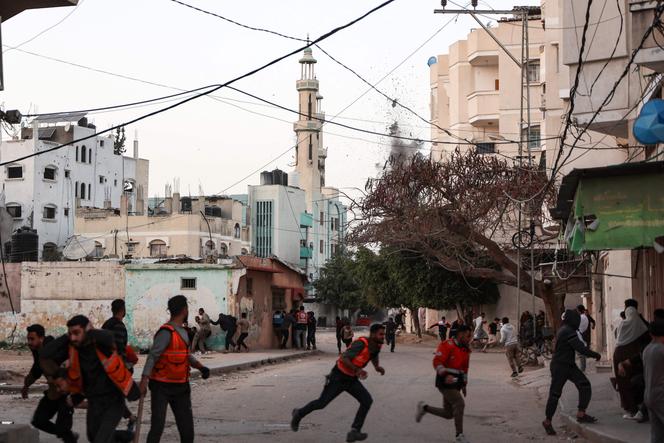

Over 1,100 Palestinians killed, hundreds wounded, destruction piling up onto already unprecedented devastation – this is the current toll of Israel's unilateral resumption of the war in Gaza. After tearing up the ceasefire agreement, which had outlined a three-phase plan for returning to lasting calm, on March 18, Israel once again deployed its troops, forcing the Palestinians into renewed internal displacement within the narrow strip of land carved up by corridors.
This resumption of fighting has been accompanied by deeply disturbing events: The bombing of a school that had been serving as a refuge, on the night of April 2, killing at least 30 Palestinians, and the discovery of the bodies of 15 rescue workers in a mass grave in southern Gaza, on March 30. The latter were evidently shot while conducting a rescue mission. The Israeli army has claimed to be investigating what could constitute a war crime. Yet another one. Impunity has prevailed since the start of Israel's military operations, as it continues to impose a media blackout on the war, by barring international press access to Gaza.
Among the reasons cited by Benjamin Netanyahu, those relating to crushing Hamas and liberating the last Israeli hostages captured during the October 7, 2023, terrorist attack are not very convincing. Indeed, over 16 months of massive bombings have not achieved either of these goals. However, the aim to "implement the Trump plan," as declared by the Israeli prime minister on March 30, must be taken seriously. It is a case of ethnic cleansing, disguised as a "voluntary migration plan" by Israeli authorities, who announced the creation of a special administration. "It is our strategy and we're not hiding it," confirmed Netanyahu.

The degree of violence of the new bombings and the food blockade, which has been imposed for over a month now, underscore the cynicism behind the phrase "voluntary migration." Netanyahu benefits from a diplomatic immunity that has only emboldened him to press his advantage. The illiberal Hungarian prime minister, Viktor Orban, has indulgently provided him with the opportunity, not only by inviting him for a four-day visit to Budapest, where he arrived on April 3, but also by announcing, that same day, Hungary's withdrawal from the International Criminal Court (ICC). The ICC had issued arrest warrants in 2024 against Netanyahu and former Israeli defense minister Yoav Gallant, both charged with "crimes against humanity" and organizing "starvation as a method of warfare."
This trip to Budapest marks Netanyahu's first visit to a country that was once an ICC member. Orban's decision to leave the court is a victory for Netanyahu, as, despite some countries like Germany, France, and Poland expressing doubts about the possibility of arresting the Israeli prime minister should he visit their territories, these states have not renounced the ICC. All other European Union countries are ICC members.
Orban thereby strengthens the solidarity of illiberal regimes with the Israeli prime minister, whose authoritarian drift has increasingly borrowed methods from such regimes, notably by attacking the judiciary. Donald Trump's return to the White House can only serve to encourage them.
Translation of an original article published in French on lemonde.fr; the publisher may only be liable for the French version.
